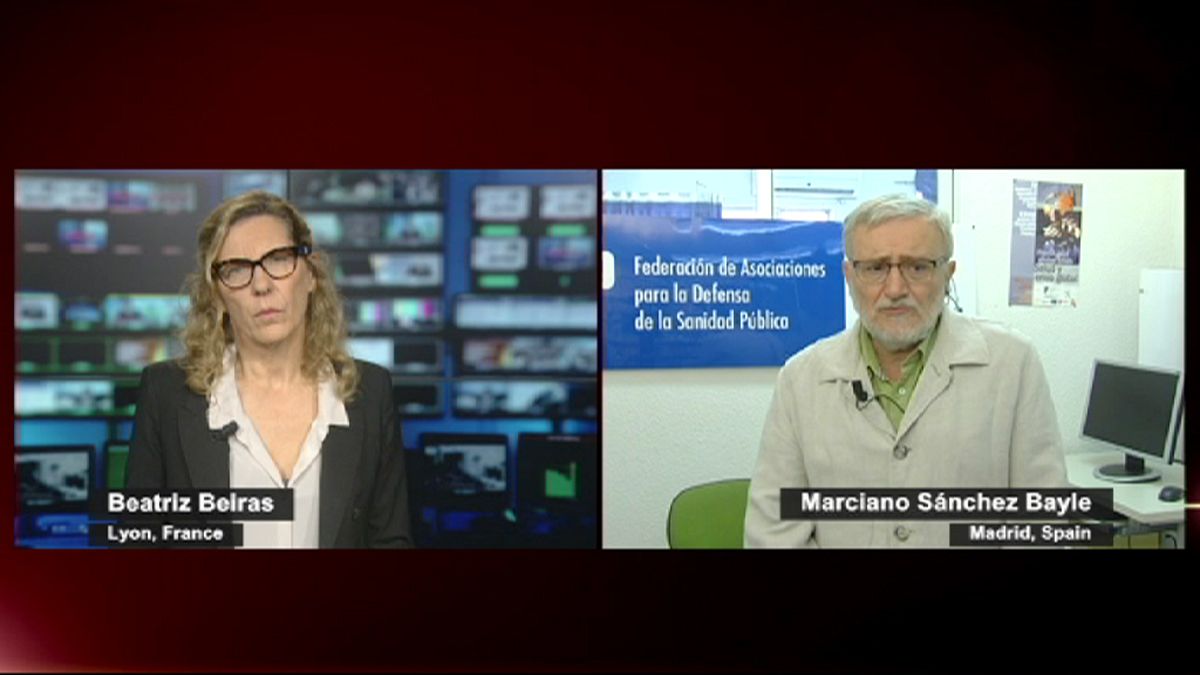In August, the first European infected with the Ebola virus in Western Africa was repatriated to Spain, a missionary who had lived for many years in Liberia. It was a medical-military operation following high security protocols. He was 75.
They took Miguel Pajares to Torrejón de Ardoz air force base near Madrid, and cleared the whole sixth floor of the Carlos III hospital to treat him and put him on the experimental drug ZMapp. But all those resources couldn’t save him. He died on the 12th of August.
Another missionary, Manuel Garcia Viejo, died on the 25th of September, at the same Madrid hospital, after the 69-year-old had been repatriated from Sierra Leone with Ebola. A team of 30 health professional volunteers worked to save the two patients.
They took great precautions but not enough. Eleven days after Garcia Viejo’s death, Monday, the Spanish Health Minister Ana Mato called the media.
Mato said: “This evening we identified a case of transmission of the Ebola virus from a patient in our country. We are coodinating our best efforts for the patient, and to guarantee the security of all our citizens.”
It was one of the volunteers, a 40-year-old nurse’s aide who helped clean the two missionaries. On the 30th of September she reported her temperature was at 38.6 degrees Celsius and she felt bad. But according to a Madrid regional health service official she was not sent to hospital because she lacked the clinical criteria. Then her fever got worse.
It was left for the public health chief to explain.
Director General of Public Health Mercedes Vinuesa said: “We have to find how this professional was infected. We know she was in Manuel Garcia Viejo’s room twice, once before his death, to change a diaper, and once afterwards to clean up. According to our information, she went in with full protective equipment.”
Many Spaniards want to know why the missionaries were brought back.
One woman interviewed outside the hospital said: “I think it was harmful to bring them to Spain. Spaniards or not, they had lived abroad for 20-30 years. I think it would have been best to leave them where they were.”
We spoke with Doctor Marciano Sánchez Bayle, a paediatrician, kidney specialist and spokesman for the Public Health Service Defence Federation, in Madrid.
Producer Beatriz Beiras asked: “In light of what’s happened, was it an error to repatriate the two missionaries?”
Marciano Sánchez Bayle: “The way I see it, yes, because a disease has been imported that didn’t exist here before, and it was treated in a place that did not meet adequate security conditions, as we’ve seen.”
euronews: “A health professional catching the Ebola virus in a Spanish hospital with the standing of Carlos III is surprising, both to ordinary people and the scientific community. What’s your assessment?”
Sánchez Bayle: “I don’t think it’s that surprising because there has been an attempt to dismantle the Carlos III Hospital by the Madrid regional health community with the support of the Ministry of Health, and so today it’s not what it used to be.”
euronews: “What do you mean, ‘dismantle’?”
Sánchez Bayle: “The whole section devoted to infectious illnesses has been closed. The professionals who worked there have been moved to other positions. The laboratory was closed, and so was the intensive care unit. It’s just to say that, one way or another, its capacity to take care of illnesses with these characteristics has been most remarkably reduced.”
euronews: “Members of the CSI/F public sector workers union told euronews that the maximum level 4 clothing required when treating the Ebola patients was not always used. Have you heard about these allegations?”
Sánchez Bayle: “Yes, there have been numerous complaints, in the sense that there was little information and training of health professionals involved in caring for the Ebola patients, and people also said that the means for guaranteeing protection were insufficient or not of the required quality.”
euronews: “There have been lots of questions about the procedure followed for the nurse’s aide from the time she first felt symptoms. For example, didn’t they wait too long before isolating her?”
Sánchez Bayle: “Clearly, she should have been quarantined right away, and the fact she moved around freely in the city of Madrid for several days, while she was carrying the illness, that adds more risks. They have to be considered important.”
euronews: “A lot of people don’t know how the Ebola virus is spread. Can you tell us, briefly?”
Sánchez Bayle: “The virus is contagious only when there is direct contact with the bodily fluids of the sick, such as saliva, sweat, blood, urine and semen. Transmission cannot be airborne.”
euronews: “How do you rate the Health Ministry’s management of this crisis?”
Sánchez Bayle: “I think what is happening is very serious. I think the people in charge should resign immediately. They should guarantee that sufficiently qualified and responsible people are given the job of handling the problem. That is not currently the case.”
